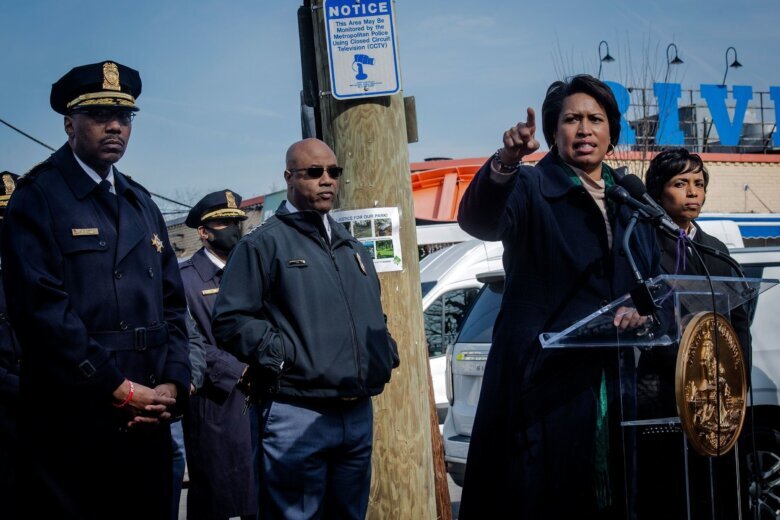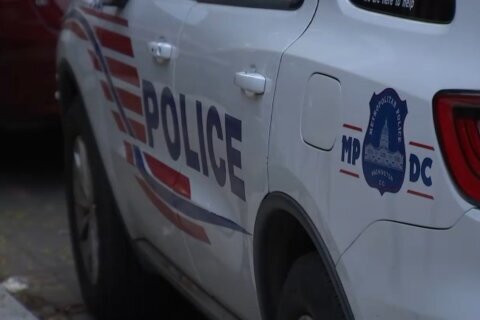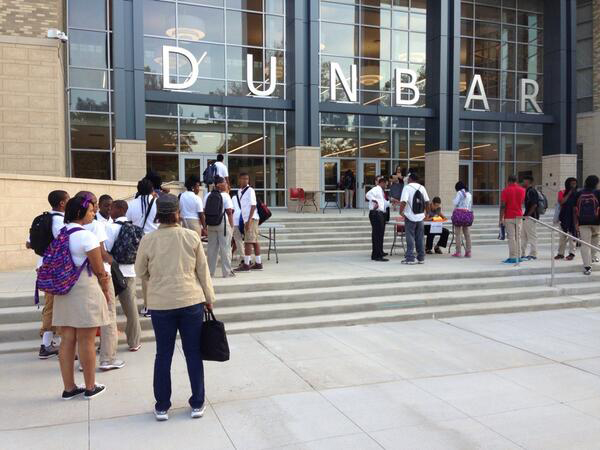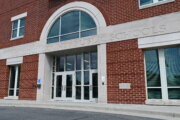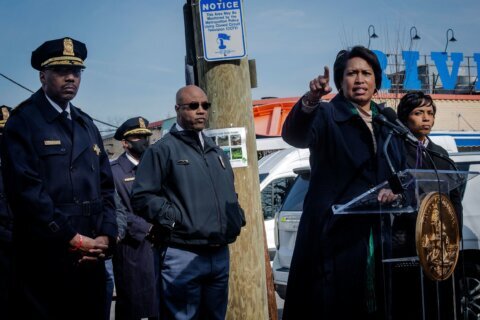
Washington, DC (CNN) — On a recent Tuesday morning, guards escort Malcolm, a 17-year-old from DC, into a circuit courtroom in Maryland where he’ll soon be sentenced for attempted robbery. As he walks to his seat, slumped and handcuffed in a jail jumpsuit, with an exhausted look on his face, he gives a subtle nod to five boys in the gallery – his friends who have come to witness his fate.
“Let’s pray for Malcolm,” says Jawanna Hardy, an adult chaperoning the teens, as she reaches for their hands. They bow their heads. She asks the Lord for a lenient sentence.
The 14-year-old boy beside her – we’re calling him “Sam” to protect his identity – keeps his eyes open through the prayer, blankly staring down. As the hearing gets underway, he quietly voices his discomfort and fear for his friend.
“I don’t want to be here,” Sam says. “This is real.”
Seeing the consequences of crime was the goal of Marcelles Queen who has been mentoring the teens since another friend of theirs was shot and killed last year. He encouraged them to attend the hearing.
“I want (them) to understand that the playing is over, that they’re trying to hold you accountable,” he said, adding the teens have questions about why their friends are being charged as adults and not being allowed to go home.
Queen sits behind the boys, occasionally clarifying what’s happening in the court proceeding.
Malcolm previously pleaded guilty to attempted robbery after facing charges for the attempted armed carjacking of a plainclothes police officer, according to his attorney and mother.
Malcolm’s lawyer asks the judge to move the case to juvenile court since he was 16 when he committed the crime. The judge, torn by the severity of the offense, eventually grants the request. Malcolm will serve out his sentence in a juvenile facility. His mother tells CNN she doesn’t know how long he’ll be incarcerated.
After the hearing, Malcolm’s friends, ranging in age from 13 to 16, huddle outside the courthouse.
“Jail is not a game,” one of them says. “You’ve got to put your big boy pants on when it comes to stuff like that.”
A youth crime emergency
Fear has been growing in the nation’s capital amid a violent crime surge, up 39% last year and many kids are caught up in it.
Data show juveniles make up the majority of arrests in DC for crimes like robbery and carjacking. For carjackings, which nearly doubled in 2023, the average age of those arrested was 15 years old. Guns are used in about half of carjackings, police data show.
City officials have faced widespread criticism for the alarming crime numbers as well as a drop in arrests and prosecutions. Some argue many defendants, including juveniles, have received a slap on the wrist after committing serious offenses.
In recent months, city leaders have turned to some tough-on-crime measures to address the crisis.
DC’s city council advanced a wide-ranging anti-crime bill earlier this month with tough measures, including extending pretrial detention for children accused of various crimes.
The bill would also expand the definition of carjacking, which has already become a high-profile issue, particularly following the deaths of two victims this year.
It follows the declaration last year by the district’s mayor of a juvenile crime emergency. DC police are expected to open a new multiagency real-time crime center in the coming weeks.
But CNN found some teenagers in the nation’s capital don’t seem to think committing violent crimes like carjacking is a big deal for them or their peers.
“All they think they’re doing is getting the car and driving the car around,” said one 15-year-old, who we’re calling “Eddie” to protect his identity. “They don’t see the impact they do to other people, (who) get hurt. You might scare people when you jack somebody for their car.”
Eddie tells CNN he was shot in the leg last year during an altercation in which his friend was killed. He isn’t in school – another pervasive problem for kids in DC.
Eddie is one of the teens Queen is trying to keep off the street and out of trouble. He says he organizes activities and events for the boys, pulling in what resources and funding he can from others in the community.
“I was a troubled youth – I spent time in juvenile detention centers, federal correctional facilities, I’ve been shot before,” Queen told CNN. “I want them to have a little bit of a notice ahead of time – this is how this works. So, let me avoid this because it’s not a game.”
Queen says the problems typically begin well before kids start stealing cars, and intervention has to begin earlier too, when children are missing school or their families don’t have enough support or resources.
“It’s definitely a crisis,” he said. “I’ve never seen 12-year-olds do the things that they do.”
“Support is needed,” he added. “Jail is not.”
Intervening early
Curtis Brothers, a formerly incarcerated man who now volunteers as a “violence interrupter” with the Alliance of Concerned Men trying to keep the streets of Southeast DC calm, says the overloaded juvenile justice system is part of the problem. He argues sentences are too lenient and many youths don’t believe they will get locked up for even serious crimes.
“They believe they ain’t going,” he said. “The juvenile system is overcrowded so you almost got to catch a couple of murders just to do a couple of months.”
Brothers is tasked with maintaining “safe passage” for students on the street outside a DC middle school, so they can get to and from class safely.
“This is the most vulnerable age,” he said about the middle schoolers. “Once you get over 13, your mind is pretty much made up, you feel like you know everything… Once they get to high school, it’s probably over.”
Violence interventions are increasingly geared toward even younger children. The group runs a conflict resolution class for kids as young as 5 years old, with a goal to break the cycle, helping the kids become role models and community change agents by the time they’re teenagers.
Down the hall from the class, CNN sat down with two teens who work with ACM – we’re calling them “Deon” and “Steve” to protect their identity – to discuss why kids are committing these crimes, also known as “crashing out.”
Deon, 16, and Steve, 17, have both been previously incarcerated for robbery and gun charges. Both were court-mandated to work with ACM, mentoring other kids on conflict resolution, though Steve recently completed his obligation and has continued the work voluntarily.
“A lot of people crash out because they don’t have the right guidance, they don’t got mentors, they ain’t got nobody to talk to,” Steve said.
“Everything is getting more fast-paced,” Deon added. “They scroll on their phone. They see, you did this, you stole a car… and that’s going to influence them… They’re like, I’m hungry, I ain’t got no clothes, my brother’s locked up, my mother’s not doing nothing for me, so let me go do this.”
They’re among the many who argue DC cannot just arrest and prosecute its way out of this crisis. The district is still experiencing hypergentrification and stark pockets of poverty, made worse by the weight of recent extreme inflation on struggling families. Plus, social media and its pressure to keep up with peers in many cases has added a toxic layer to vulnerable kids’ lives.
“If they intervene way before the point of ‘crashing out,’ then it would never happen,” Queen said. “Every single case (of a child facing criminal charges) you see 100 days missing school, no food in the household. Why does it take something so major to see, oh, we’re failing our kids.”
Referring to the calls to increase incarceration for teens, he said: “And the saddest thing about it is, they’re willing to throw our kids away instead of fix our families.”
This story has been updated to clarify the circuit courtroom was in Maryland.
The-CNN-Wire
™ & © 2024 Cable News Network, Inc., a Warner Bros. Discovery Company. All rights reserved.

